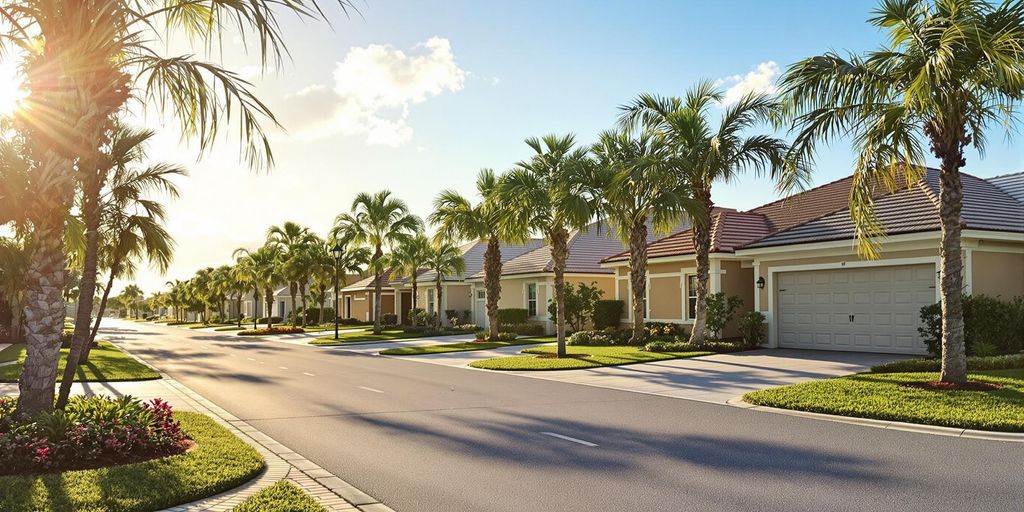Florida’s housing market is experiencing a significant shift, moving from a seller’s to a buyer’s market. This change is characterized by increased inventory, price reductions, and a cooling demand, particularly in areas that saw rapid growth during the pandemic. Sellers are now adjusting expectations as the market stabilizes.
Florida’s Housing Market Cools
Florida, once a booming real estate hotspot, is now seeing a notable slowdown. A recent analysis by Realtor.com indicates that Florida dominates the list of markets where home prices are being slashed from their original asking prices. Seven of the top ten such markets nationwide are in Florida, reflecting a significant shift in market dynamics. This cooling trend is attributed to an oversupply of homes and a decrease in buyer demand.
Key Takeaways
- Price Reductions: Cities like North Port (30%), Tampa (29.3%), Cape Coral (28.2%), and Jacksonville (27.6%) are experiencing the highest percentages of price cuts.
- Increased Inventory: The number of homes for sale in South Florida (Miami-Dade, Broward, and Palm Beach counties) has quadrupled since 2022, reaching nearly a decade high.
- Buyer’s Market: Six of the top buyer’s markets in the U.S. are in Florida, including Miami, West Palm Beach, Fort Lauderdale, Jacksonville, Tampa, and Orlando. This means buyers have more options and negotiation power.
- Affordability Crisis: Soaring home prices, high homeowners’ insurance premiums (averaging $11,000 annually, nearly four times the national average), and rising property taxes are making homeownership increasingly difficult for many residents.
- Out-Migration: Many Floridians are finding it difficult to stay in the state due to the escalating cost of living, with some seeking more affordable options in neighboring Southern states.
Factors Contributing to the Shift
The current market correction in Florida is a result of several converging factors:
- Pandemic-Era Growth Reversal: The rapid influx of residents and investors during the COVID-19 pandemic led to unsustainable price surges. As remote work policies change and interest rates remain high, demand has softened.
- High Ownership Costs: Beyond mortgage rates, the exorbitant cost of homeowners’ insurance, particularly due to natural disaster risks, and increasing HOA fees (especially after stricter regulations post-Surfside condo collapse) are significant deterrents for buyers and a burden for existing homeowners.
- Oversupply: Homebuilders increased activity during the boom, leading to a surplus of new constructions that are now struggling to find buyers.
- Investor Pullback: Real estate investors, who previously flocked to Florida for quick returns, are now exiting the market, further contributing to the increase in listings.
Market Outlook
While the term "crash" is often used, experts suggest that Florida is more likely experiencing a significant price correction rather than a catastrophic collapse similar to 2008. This correction aims to realign home prices with local incomes and historical trends. Markets like Winter Haven and Tampa are flagged as high-risk for further price declines. For buyers, this shift presents opportunities, but caution and thorough research are advised. Sellers, on the other hand, must be realistic about pricing and prepare for longer market times. The long-term appeal of Florida remains, but the housing market is entering a more balanced, albeit challenging, phase.
Sources
- Housing market hitting the brakes? New analysis finds Florida dominates areas slashing home prices, Florida Politics.
- Florida markets Miami, Tampa, Jacksonville lead top buyer’s markets: Report, wtsp.com.
- Southern state residents ‘desperate to escape’ but homes won’t sell as crash looms, Daily Mail.
- Florida’s Housing Market ‘On the Brink’, Newsweek.
- 2 Florida Housing Markets Flagged for a Major Price Decline Risk, Norada Real Estate Investments.


